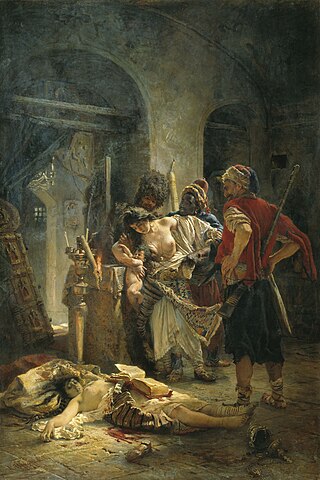
Sacrilege is the violation or injurious treatment of a sacred object, site or person. This can take the form of irreverence to sacred persons, places, and things. When the sacrilegious offence is verbal, it is called blasphemy, and when physical, it is often called desecration. In a more general sense, any transgression against what is seen as the virtue of religion would be a sacrilege, and so is coming near a sacred site without permission.

Arson in royal dockyards and armories was a criminal offence in the United Kingdom and the British Empire. It was among the last offences that were punishable by capital punishment in the United Kingdom. The crime was created by the Dockyards etc. Protection Act 1772 passed by the Parliament of Great Britain, which was designed to prevent arson and sabotage against vessels, dockyards, and arsenals of the Royal Navy.

The Proceeds of Crime Act 2002 (POCA) is an act of the Parliament of the United Kingdom which provides for the confiscation or civil recovery of the proceeds from crime and contains the principal money laundering legislation in the UK.

The Police and Criminal Evidence Act 1984 (PACE) is an Act of Parliament which instituted a legislative framework for the powers of police officers in England and Wales to combat crime, and provided codes of practice for the exercise of those powers. Part VI of PACE required the Home Secretary to issue Codes of Practice governing police powers. The aim of PACE is to establish a balance between the powers of the police in England and Wales and the rights and freedoms of the public. Equivalent provision is made for Northern Ireland by the Police and Criminal Evidence Order 1989 (SI 1989/1341). The equivalent in Scots Law is the Criminal Procedure (Scotland) Act 1995.

The Offences against the Person Act 1861 is an Act of the Parliament of the United Kingdom of Great Britain and Ireland. It consolidated provisions related to offences against the person from a number of earlier statutes into a single Act. For the most part these provisions were, according to the draftsman of the Act, incorporated with little or no variation in their phraseology. It is one of a group of Acts sometimes referred to as the Criminal Law Consolidation Acts 1861. It was passed with the object of simplifying the law. It is essentially a revised version of an earlier consolidation act, the Offences Against the Person Act 1828, incorporating subsequent statutes.

The Official Secrets Act 1911 was an Act of the Parliament of the United Kingdom. It replaced the Official Secrets Act 1889.

The Official Secrets Act 1989 is an Act of the Parliament of the United Kingdom that repeals and replaces section 2 of the Official Secrets Act 1911, thereby removing the public interest defence created by that section.

The Piracy Act 1698 was an Act of the Parliament of England passed in the eleventh year of King William III. The main purpose behind the statute was to make some corrections to the Offences at Sea Act 1536.

Criminal damage in English law was originally a common law offence. The offence was largely concerned with the protection of dwellings and the food supply, and few sanctions were imposed for damaging personal property. Liability was originally restricted to the payment of damages by way of compensation.

The Criminal Law Act 1967 is an Act of the Parliament of the United Kingdom that made some major changes to English criminal law, as part of wider liberal reforms by the Labour government elected in 1966. Most of it is still in force.

The Petitions of Right Act 1860 was an Act of Parliament passed by the Parliament of the United Kingdom that codified and simplified the process of obtaining a petition of right.

The Larceny Act 1916 was an Act of the Parliament of the United Kingdom. Its purpose was to consolidate and simplify the law relating to larceny triable on indictment and to kindred offences.

The Piracy Act 1850, sometimes called the Pirates Repeal Act 1850, is an Act of the Parliament of the United Kingdom. It relates to proceedings for the condemnation of ships and other things taken from pirates and creates an offence of perjury in such proceedings.
The first signs of the modern distinction between criminal and civil proceedings were during the Norman conquest of England in 1066. The earliest criminal trials had very little, if any, settled law to apply. However, the civil delictual law was highly developed and consistent in its operation.

The Criminal Justice Act 1988 is an Act of the Parliament of the United Kingdom.

The Royal Marine Police (RMP) was a police force in the United Kingdom formed under the Special Constables Act 1923 which existed from 1934 to 1949.

The Admiralty, &c. Acts Repeal Act 1865 was an Act of the Parliament of the United Kingdom.

The Special Constables Act 1923 was a British act of parliament passed in 1923. It made permanent an earlier act on special constables passed in 1914. Words and sections from the Act were repealed by the Police (Scotland) Act 1956 and the Police Act 1964 and – though it has not been repealed in its entirety – none of its Sections are now in effect.

The Dockyard Ports Regulation Act 1865 was a UK act of parliament, which gained royal assent on 6 July 1865. It applied to "any port, harbour, haven, roadstead, sound, channel, creek, bay, or navigable river of the United Kingdom in, on, or near to which Her Majesty now or at any time hereafter has any dock, dockyard, steam factory yard, victualling yard, arsenal, wharf, or mooring", though it also reserved the monarch the right to define by Orders in Council the limits of a dockyard port for the Act's purposes.








